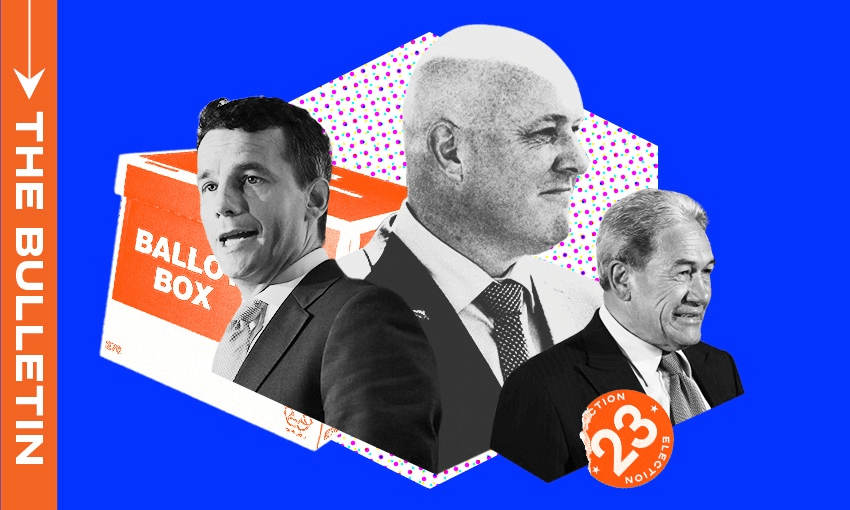David Seymour says National and Act getting close to draft agreement. Sources say a final deal is still some time away while Labour will meet today to vote on the party’s leadership, writes Anna Rawhiti-Connell in this excerpt from The Bulletin, The Spinoff’s morning news round-up. To receive The Bulletin in full each weekday, sign up here.
Near and far: close to deal, and also no deal near agreement stage
I’m going straight to Céline fan jail for today’s headline, but the Titanic earworm got lodged after reading various progress reports on how coalition talks are going. Act’s David Seymour says talks with National are progressing well, and they are getting close to having a draft agreement, but Seymour is seemingly yet to speak with NZ First leader Winston Peters. Newshub reported last night that sources say there’s no document near the agreement stage but that a document put together by Act has been shared with National. Apparently, that’s more of a progress report and “a final deal is still a way away.” As always, Peters is saying nothing. Filling the void is John Campbell, who muses out loud about the virtues of the interregnum. “It occurs to me, about 90 hours after the special votes told us that Winston Peters would, indeed, be required – that the time between governments isn’t all bad,” he writes.
Unofficial, effective Apec deadline looms
We’re now 24 days on from the election, and the Apec leaders’ forum in San Francisco draws ever nearer. As Newsroom’s Jo Moir writes, Christopher Luxon would really like to be there. While he “has tried to downplay that by saying he won’t go to Apec if government talks aren’t complete, it’s effectively already put an unofficial deadline on talks.” Apec leaders are due to gather in the golden city between November 15-17. Moir reports that coalition talks are slow-going with David Seymour in Auckland and Winston Peters in Wellington, and no meetings in the diary between the two scheduled this week. The unofficial effective Apec deadline gives Seymour and Peters an advantage in talks, says Moir. While we wait, BusinessDesk’s Pattrick Smellie (paywalled) turns his attention to the fiscal realities awaiting the incoming government, deducing that National’s tax package will have to be recut and that “the staged political approach to doing this would be to make it an outcome of the coalition negotiations.”
Labour to meet today, vote on leadership
Meanwhile, Labour will continue its post-election reflection today but may steer clear of digging too deep just yet. As Luke Malpass reports for The Post today, a leadership vote is on the agenda, but “today is highly unlikely to be a come-to-Jesus type meeting where Labour finds a hole in its soul that need plugging by some big changes or fights. Everyone is too tired and still too shell-shocked.” Malpass notes you can never say never, but there doesn’t seem to be a strong desire to see Hipkins rolled among Labour’s caucus. The Herald’s Thomas Coughlan reports that while there had been rumblings of a challenge by David Parker, he does not appear to have the numbers.
Reversals and recounts
Despite having said previously that he would quit politics if he lost his seat, Labour’s deputy leader Kelvin Davis has said he will continue his career in politics as a list MP. Davis lost his Te Tai Tokerau seat to Te Pāti Māori’s Mariameno Kapa-Kīngi after special votes were counted. Question marks remain for other Labour MPs. Peeni Henare is mulling a recount in Tāmaki Makaurau where Te Pāti Māori’s Takutai Moana Kemp has a 4-vote majority. National’s Melissa Lee is also likely to seek a recount in Mt Albert, where Helen White has a 20-vote lead and National are calling for one in Nelson, where Blair Cameron lost to Labour’s Rachel Boyack by 29 votes. Applications for recounts must be filed by tomorrow, November 8. The election, it goes on.


